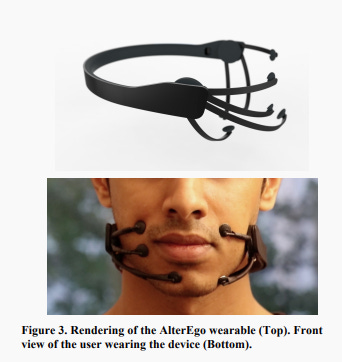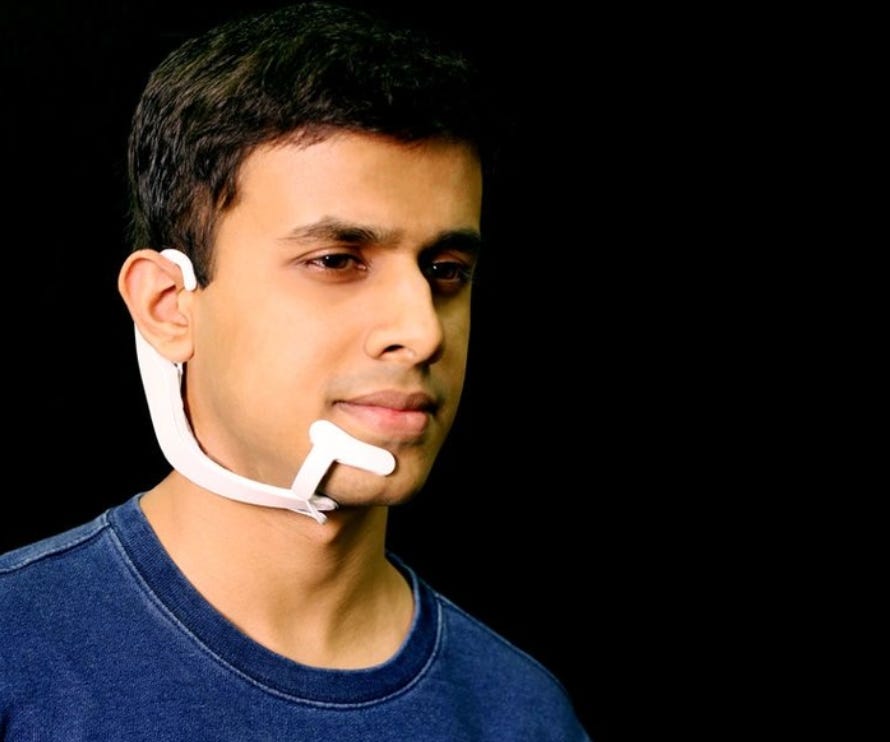
MIT Media Lab Lets You Talk Without Speaking with AlterEgo
But what's wrong with good, old-fashioned speech?
Last week, MIT Media Lab released a new video showcasing AlterEgo, a wearable device that allows you to “talk” without ever opening your mouth.
Unlike projects from Apple or Meta that attempt to read your thoughts directly, AlterEgo relies on tiny electrical signals in your jaw and face—the subtle muscle activity triggered when you use your inner voice to read or silently talk to yourself.

How It Works
When you form a thought, your brain translates it into nerve impulses. These impulses fire across neuromuscular junctions, creating faint electrical signals in your facial and neck muscles—even if you never actually speak aloud.
AlterEgo uses seven skin-mounted electrodes to detect these signals. An AI model then reconstructs the intended words.
Unlike invasive approaches like Neuralink, AlterEgo is non-invasive. It’s not a brain implant, nor does it require sensors to be placed inside the mouth. Other noninvasive systems like EEG have struggled with reliability, but AlterEgo aims to overcome that.
MIT’s research began with simple yes/no recognition, then built up to larger vocabularies. The system supports different “modes”—for instance:
- Math Mode for numbers and arithmetic.
- Clock Mode for cities and times.
- Conversation Mode for human-to-human silent speech.
Potential Applications
Researchers outlined three use cases for AlterEgo:
- Closed-loop: interacting with a computer, dictating notes, or solving equations.
- Open-loop: controlling nearby devices or services (like silently calling an Uber).
- Human-to-human: two people conversing in silence.
In practice, AlterEgo could:
- Dictate silently into apps.
- Translate your words into another language.
- Recognize gestures with its built-in camera.
- Mimic your inner voice as audible speech.
But not every feature feels revolutionary. For example, highlighting text to have AlterEgo research it seems less efficient than simply typing into a search bar.
Who It’s For
The device is primarily positioned as assistive technology for people with speech impairments.
The National Institute on Deafness reports that 1 in 14 U.S. children (7.2%) ages 3–17 experienced a voice, speech, or language disorder in the past year. For individuals with severe cases, AlterEgo could be life-changing.
Still, some worry that overreliance on silent communication devices might cause natural speech skills to atrophy over time—especially at a moment when in-person communication already feels increasingly fractured.
The People Behind AlterEgo
- Arnav Kapur: MIT Media Lab researcher; projects with Harvard Medical School; contributor to UN reports on assistive technologies.
- Max Newlon: President of BrainCo, a $1B neurotech startup; venture investor in human potential technologies.
- Pattie Maes: Head of MIT’s Fluid Interfaces Group; WEF “Global Leader for Tomorrow”; pioneer of early recommendation algorithms in the 1990s.

My Take
The most remarkable thing here isn’t the gadget itself—it’s the human ability to turn thought into sound. The biological complexity of speech is far more impressive than any wearable device.
As a product, AlterEgo looks bulky and, for most people, is still slower than simply speaking out loud. But its potential for accessibility is undeniable.
The bigger question: do we really want to route even more of our communication through machines? In-person conversation is already under strain. Adding another layer of AI-mediated speech feels like a step deeper into transhumanism—perhaps unsurprising, given the developers’ ties to the UN and WEF.
Final Thoughts
AlterEgo represents a fascinating leap in silent speech interfaces—one that could dramatically improve accessibility but also raises deeper questions about the future of human interaction.
Will it empower people or make us more dependent on machines to communicate? Would you use AlterEgo?
This is a segment from #TBOT Show Episode 14. Watch the full episode here!

Are you ready for a phone that respects you?
Enjoy private app stores, secure web browsing and communication, download videos to your phone, help the community with apps like StreetComplete, and so much more.
🔥 And best of all, there’s zero connections to big tech!
Take Back Our Tech Newsletter
Join the newsletter to receive the latest updates in your inbox.





